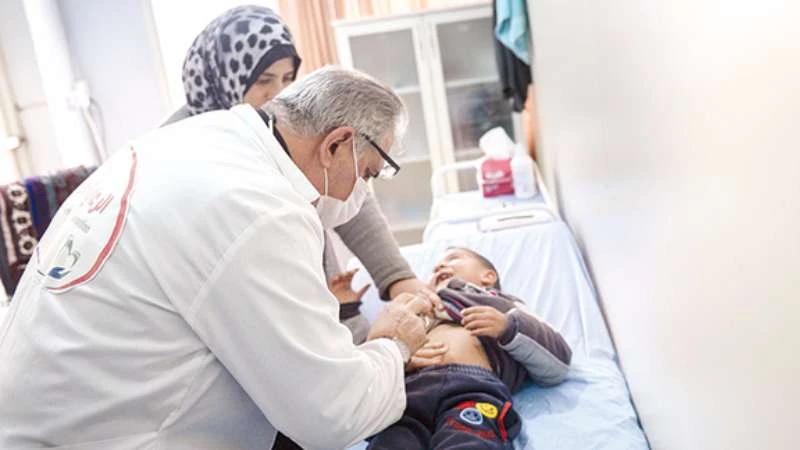Some 91 percent of at least three million Syrian refugees in Turkey have been living outside refugee camps, according to recent reports.
Refugees’ needs have been met by 50 registered international organizations since 2012. One of them, the International Medical Corps (IMC), has been working on health, psychical rehabilitation, nutrition, psycho-social support, and the protection of women and children in the capital Ankara, and the southeastern border provinces of Hatay, Gaziantep, Kilis and Sanliurfa for the past five years.
Some 32,500 Syrian refugees every month have been able to receive free service from nine medical clinics located in the border provinces. Syrians are given access to state hospitals too, however, prefer to receive treatment from these clinics due to language barriers they face in Turkish state hospitals, according to the IMC.
The IMC, a registered international aid organization, opened a clinic in Hatay’s Reyhanli district, but was only given a license last year. A Turkish doctor in charge of the clinic visits the hospital once a week for inspection. The clinic is prohibited from serving Syrians without ID cards. The clinic hosts 400 patients on average every day, where seven Syrian doctors are currently working.
Nihat Varan, an IMC official, said the Syrian doctors had to work as practicing physicians and not as doctors as they left their diplomas in Syria.
Muhammed Hussein, one of the doctors who could not be entitled as a professional doctor, said he had worked for 34 years as a doctor and had retired before the war in Syria, noting that he was earning 950 US dollars per month.
One of the other practitioners, Hafez El Selah, an ophthalmologist, said he missed conducting surgeries.
“I was living in Deir-ez Zour before ISIL One of the only registered clinics in Gaziantep is in the Nizip district. A nurse, Meise, who works at the clinic, said she considered herself lucky. A physical rehabilitation center and its mobile crews served 3,550 disabled people each month. Among its patients was a little girl who lost a leg after a bomb exploded while she was playing in a street in Damascus. With the help of the center, she is trying to recover. The IMC’s women’s centers have been providing service to women survivors of sexual abuse and physical violence, with 2,000 women on average receiving treatment from one women’s center in Kilis each month. Najlaa Sheekh, the founder of the center, said they found solidarity among each other. “There are a lot of women who have lost their husbands, children, fathers and brothers here. Earlier, we were pouring out our grief to each other. Afterwards, there were 45 of us and we founded this center,” she said. Women can also receive training in hairdressing, make-up, stitching, and language classes in the center. The frequenters of the center said their ambitions were to become doctors, engineers or teachers, before the war. “We started from scratch here. We are supporting our families by hairdressing. We want to open our own hairdresser salons one day,” women from the center said. Turkey hosts scores of Syrian organizations. One of them, Watan, has been working on providing education to children left out of schools since 2012. The founder of the organization, Iyad Agha, said 40 percent of the Syrians in Turkey needed help.



التعليقات (0)